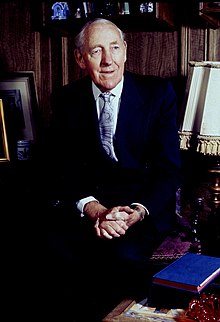Jack Hulbert
John Norman "Jack" Hulbert (born April 24, 1892 in Ely , United Kingdom , † March 25, 1978 in London ) was a British actor, comedian and entertainer (singer) in the stage, film and television as well as a screenwriter, choreographer, television producer and film director.
Live and act
The versatile entertainer attended Westminster School in London and Caius College in Cambridge and gained his first experience as an entertainer while still a student at Cambridge University Footlights Dramatic Club . His talent as a comedian should also come to the fore early on in other artistic areas (dance and singing). Hulbert's visual trademarks were the huge chin and his broad grin. He was offered his first major theater role by the theater man Robert Courtneidge: In the play " The Pearl Girl " Hulbert played at the side of his daughter Cicely Courtneidge (1893-1980), who was to become Hulbert's wife in 1916. The marriage lasted for 62 years, until Hulbert's death, and was considered extremely happy. Hulbert and Courtneidge worked together in an abundance of theater productions and also appeared together in front of the camera in numerous films.
With the start of the sound film era in England in 1929, Hulbert switched to film and enjoyed great success as a comedian there throughout the 1930s until the outbreak of World War II . Hulbert also wrote the script for some of these lightweight strips, performed various songs and occasionally even took part in the directing. In a survey at the beginning of 1935, Hulbert was considered the most popular British film actor in his country, with only six Hollywood greats ahead of him. Jack Hulbert was seen several times then as in later years as the ironically colored version of the cliché British; so he played the military, senior police officers or nobles. After the war, Jack Hulbert concentrated on the stage and in the early post-war years also on television, but was unable to continue his successful years in the pre-war period. In 1962 he could be heard at the side of his wife on the BBC radio sitcom Discord in Three Flats . In 1975 Hulbert's autobiography " The Little Woman's Always Right " was published. Hulbert's younger brother Claude Hulbert (1900–1964) was also an actor.
Filmography
- 1930: Elstree Calling (also co-director and vocals)
- 1931: The Ghost Train
- 1931: Sunshine Susie
- 1932: Happy Ever After (also co-script and vocals)
- 1932: Love on Wheels
- 1933: Falling for You (also vocals, screenplay and direction)
- 1934: Jack Ahoy (also vocals)
- 1934: Soldiers of the King (screenplay)
- 1935: Bulldog Jack (also screenplay)
- 1936: Jack of All Trades (also screenplay and direction)
- 1937: Take My Tip (also screenplay)
- 1937: Paradise for Two (also screenplay)
- 1938: Kate Plus Ten (also screenplay)
- 1940: Under Your Hat (also vocals and production)
- 1948: Quinney's (TV movie)
- 1949: The Squeaker (TV movie)
- 1949: Dick Whittington (TV film, also production)
- 1949: Smith (TV movie)
- 1950: Into the Blue
- 1950: Cinderella (TV film, also production)
- 1951: The Golden Year (TV film, also screenplay and production)
- 1951: The Wonderful Flicker Box ( The Magic Box )
- 1952: Gay's the Word (TV movie)
- 1955: Miss Tulip Stays the Night (also screenplay)
- 1960: The Spider's Web
- 1964–65: Compact (TV series)
- 1968: Party Games (TV movie)
- 1972: The Cherry Picker
- 1973: Not Now Darling
literature
- Ephraim Katz : The Film Encyclopedia, Fourth Edition. Revised by Fred Klein and Ronald Dean Nolen. New York 2001, pp. 658 f.
Individual evidence
Web links
- Biography on screenonline.org
- Jack Hulbert in the Internet Movie Database (English)
| personal data | |
|---|---|
| SURNAME | Hulbert, Jack |
| ALTERNATIVE NAMES | Hulbert, John Norman (real name) |
| BRIEF DESCRIPTION | British actor, comedian, screenwriter, singer, film director, choreographer and television producer |
| DATE OF BIRTH | April 24, 1892 |
| PLACE OF BIRTH | Ely , United Kingdom |
| DATE OF DEATH | March 25, 1978 |
| Place of death | London |
